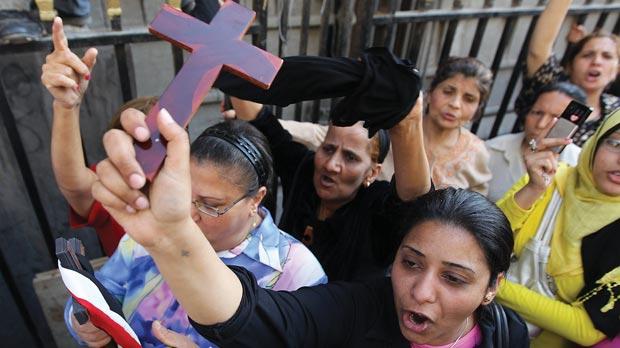
As the months have trudged by since 30 June, there has been a myriad of talk in the media regarding the creation of the new Egyptian state. The 3 July press conference, showing Al-Sisi with ElBaradei (representing the NSF), Sheikh Al-Azhar, Pope Tawadros, and the Head of Al-Nour Salafi Party, showed the outline of what this new state will “look” like: an alliance between state institutions, religious institutions, secular parties and the Salafis.
A coalition of very strange bed fellows indeed, but one that was supposed to show the plurality of the Egyptian nation and society united against the one faction that it has rejected: the Muslim Brotherhood. The interim government and the constitutional assembly reflected in their composition this coalition, where everyone is “represented” and the “New Egypt” project was re-launched for the second time in three years. Everyone thought that “we are going to get it right this time,” but as the days go by, this sentiment slowly but surely started being replaced with disappointment and disillusionment.
The months that passed by were pretty revealing to everyone watching as to the abilities of this new coalition to build this new state, and if a new state was even possible. The lackluster performance of the interim government, coupled with the final draft of the new constitution, and the local politicians complete inability to either inspire the masses or showcase ability to govern, lead to a new type of conversation, one that pushed the idea that the best that this circus can offer is a new government, but not a new state.
Amidst political analysts, a new conversation about how we need to distinguish between the government and the state or for example the distinction between ministers (government) and ministries (state.) The government may want something, the state does what it pleases, and the government has to either fight with the state or follow its cue out of fear of appearing unable to control it.
Naturally, this should lead to talks on reforming the state, but as discussed here before, we have only a mirage state: it looks like a state, has employees, paperwork, budgets and procedures, but literally produces nothing. For all of the talk for the need of a welfare state in Egypt, we currently run one of the biggest welfare programmes in the region, one that provides continuous monthly income and benefits to 6m mentally unfit Egyptians who don’t do their jobs and we like to call this programme the “Egyptian State.”
This problem isn’t new, and the ministers of the late Nazif government tried to circumvent it by operating around it. They hired highly paid consultants and advisors that did the work the state wouldn’t. Every Minister that could not get the employees of his ministry to work, and couldn’t fire them for not doing their jobs, created instead a new mini-ministry in his office, one that was manageable and could produce output for him. These mini-ministries operated outside the framework, of checks and balances of the state. Naturally, those consultants found themselves unchecked and in charge of the disbursement of huge sums of money, and were eager to give this money to private sector entities that would also “produce results.” Nepotism took over quite naturally, followed by the expectation of a commission for the contracts they handed out, and finally to keep state employees’ mouths shut, they started sharing those commissions with them, and thus finally integrating themselves within the new corrupt state.
The state employees that ended up getting a piece of the pie loved it, the ones that didn’t hated it. They spoke of the corruption of the ministers and their consultants, who were making money that would normally go to them. The media spoke of the corruption of the “government of businessmen and elites”, completely ignoring the real conversation as to why this was even possible, or why those elites removal didn’t lead those institutions to produce results, now that their corrupt leaders were technically gone. No one wanted to say the truth, that the new mafia had left the building, but the old mafia still operated. The “state mafia” knew they couldn’t be removed as the “state mafia” can’t reform itself.
In the post 30 June world, the state has to showcase that it is indeed strong, and the only way it could do that was through addressing the nation’s number one concern: security. This naturally left the ball in the court of the military, the Ministry of Interior and the judiciary. Given their intellectual bankruptcy as well, they used an old reliable plan: security repression.
Lethal crackdowns coupled with stringent laws and heavy sentencing would surely squash their opponents, the Brotherhood, and restore everyone’s faith in the state. Six months later, with the Brotherhood protests still ongoing despite all those killed, 150 police officers dead, an intelligence building in Sinai that gets blown up on weekly basis, amidst a still ongoing insurgency, everyone was starting to see that the emperor indeed was naked.
Something had to be done to preserve the illusion of the strong state for the public, and since they couldn’t beat their real enemy, the Brotherhood, they went against an enemy they can easily beat and which will provide them the “PR” they need to show how “strong” they are to the now suspecting public: revolutionary figures and activists.
So, the arrests started, followed by heavy sentencing, prompting the very media savvy but very easily emotionally manipulated revolutionary activists to scream “murder” about the return of the police state and the crackdown on activists all over the nation that they “heard of.”
The meme of “the police state is back” once examined against the “security achievements” of said police state would be laughable given the current lawless state of Egyptian streets. It accomplishes its goal perfectly: the population would hear that the police is working and the state is back to being strong (an illusion,) which translates into the belief that normalcy will return because “the state is back.” This causes them to support the security crackdown as “a positive step forward.” Needless to say, once the state runs out of famous activists they can jail for maximum PR effect (and they have,) all of this jazz will be revealed to what it truly is: a cheap trick, an illusion.
Political activism is seductive to the ethically minded individual because it provides a path to “fixing” their world. Political re-activism is seductive to weak states because by crushing the activists they get to showcase that they are strong and distract the public from their shortcomings and weaknesses. It’s a dance that gives both sides purpose, but never actually fixes the real problems that plague a nation.
While both may be delusional to different degrees, only the delusion of the state matters, since it actually affects the lives of the millions of people it is supposed to be there to serve. So please, dear Egyptian citizen, support the imprisonment of every famous revolutionary and demand that the state sentences them heavily, and then wait a week before the following thought starts creeping into your head: Why am I not feeling any safer? When you are there, take a close look at the strong state you believe now exists, and you may just have your answer.



